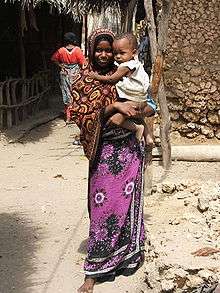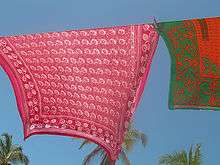Kanga (African garment)


The kanga (or khanga; from the old Bantu (Kiswahili) verb ku-kanga, to wrap or close), is a colourful garment similar to kitenge, worn by women and occasionally by men throughout the African Great Lakes region. It is a piece of printed cotton fabric, about 1.5 m by 1 m, often with a border along all four sides (called pindo in Swahili), and a central part (mji) which differs in design from the borders.
Origins

Kangas have for as long as is known been a traditional type of dress amongst women in the African Great Lakes region. Toward the eastern part of the region, phrases in Kiswahili are traditional, while in central areas phrases in both Kiswahili and Lingala are popular. Kangas are also often referred to as lesos.
Communication vehicle
One of the longer edges of the mji features a strip which contains a message in Swahili, or less commonly in Arabic or Comorian. Other countries which produce their own Kangas write the Kanga messages/names in their main languages: in Madagascar (Malagasy Republic) where they are known as lambas, they feature ohabolana, traditional proverbs written in Malagasy; they are also produced in Zambia and Malawi. This message is called the jina (literally 'name') of the kanga. Messages are often in the form of riddles or proverbs. Some examples:
- Majivuno hayafai: Greed is never useful[1]
- Mkipendana mambo huwa sawa: Everything is all right if you love each other[1]
- Japo sipati tamaa sikati: Even though I have nothing, I have not given up my desire to get what I want[1]
- Wazazi ni dhahabu kuwatunza ni thawabu: Parents are gold; to take care of them is a blessing[1]
- Sisi sote abiria dereva ni Mungu: We are all passengers, God is the driver[1]
- Fimbo La Mnyonge Halina Nguvu: Might is right[2]
- Mwanamke mazingira tuanataka, usawa, amani, maendelo: We (women) want equality, peace, and progress[1]
- Naogopa simba na meno yake siogopi mtu kwa maneno yake: I’m afraid of a lion with its strong teeth but not a man with his words[1]
Notes
- 1 2 3 4 5 6 7 "Alphabetical List of Inscriptions and Their Translations: Kanga & Kitenge: Cloth and Culture in East Africa" (PDF). Erie Art Museum. Retrieved 18 December 2009.
- ↑ Howden, Daniel (14 November 2009). "Kangalicious: Let your dress do the talking". The Independent. Retrieved 14 November 2009.
Anyone wearing a kanga with the proverb Fimbo La Mnyonge Halina Nguvu" (Might is Right) may know something about the darker side of the garment's journey from the coast into the interior.
References
- Beck, Rose-Marie (2001). 'Ambiguous signs: the role of the 'kanga' as a medium of communication', Afrikanistische Arbeitspapiere, 68, 157-169.
- Erie Art Museum. "Kanga & Kitenge: Cloth and Culture in East Africa"
- Hanby, Jeanette & David Bygott, (2006) 'Kangas - 101 Uses', HariaStamp Publishers, ISBN 9966-7146-0-X
- Hongoke, Christine J. (1993) The effects of Khanga inscription as a communication vehicle in Tanzania, Research report, 19. Dar es Salaam: Women's Research and Documentation Project.
- Linnebuhr, E. (1992) 'Kanga: popular cloths with messages', in Werner Graebner (ed.) Sokomoko: Popular Culture in East Africa (Matatu vol. 9). Rodopi, 81-90.
- Parkin, David (2004) 'Textile as commodity, dress as text: Swahili kanga and women's statements', in Ruth Barnes (ed.) Textiles in Indian Ocean Societies. London/New York: Routledge, 47-67.
- Yahya-Othman, Saida (1997) 'If the cap fits: 'kanga' names and women's voice in Swahili society', Afrikanistische Arbeitspapiere, 51, 135-149.
- Kahabi, CM. (2010) Kanga and Vitenge in Remanufactured Fashion; University of Manchester.
External links
| Wikimedia Commons has media related to Kanga. |
- Kanga pictures
- Kanga writings
- Collection of and commentary on 436 sayings on East African cloth (English)
